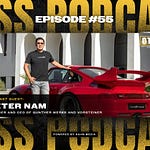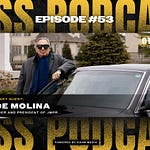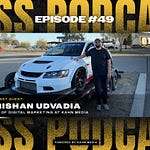On this episode of the “Only The Strong Survive” podcast, Coast Products CEO David Brands joins host Dan Kahn to discuss being a third-generation family business owner. The innovative maker of flashlights, headlamps, work lamps, knives and other products, Coast Products was originally founded in 1919 as Coast Cutlery Company by David’s grandfather. Its first product was a specialized salmon filleting knife that the elder Brands sold to canneries and fishermen across the Northwest.
Now, David is the third generation of the Brands family to run the privately held company. He has helped lead its transformation from a one-man operation selling knives out of the back of a car to a globally recognized brand. In this episode of “Only The Strong Survive,” David talks about the unique challenges faced in running a family business and what he learned from expanding Coast Products since leading the brand.
Click on the icon above to watch the entire episode, and here are our top five takeaways:
Privately held family businesses have the advantage of long-term thinking.
Innovation should be central to any brand.
Long-term partnerships are just as important as long-term thinking.
Running a family business without a clear leader doesn’t work.
Failure is a natural part of entrepreneurship.
Think Long Term
According to David, one of the most significant advantages privately held family businesses have is their ability to think long term. There are no shareholders or investors demanding a rapid return on their investment. When the family business has been handed down through generations, the thinking naturally shifts to what is best for the brand in the long term. While there is less access to capital, there is also less focus on making a quick buck.
“We have always run our company to be the leader in innovation, to have great relationships with our customers and obviously make money. The amount of money we make isn’t as important as doing things right,” said David. “That is a great luxury you have as a privately owned company that frankly, in this day and age, doesn’t exist in public companies or even in a lot of partnerships.”
Never Stop Innovating
Coast Products was founded on innovation. In 1909, it introduced a salmon fillet knife with a spoon on the other end, combining two products into one. David notes that innovation should be central to any brand, as it allows you to expand product offerings and stay ahead of your competitors. That desire to innovate was critical for Coast Products during the advent of LED technology.
“We sold the first LED flashlight ever in the United States. It had a ‘whopping’ 18 lumens of light and sold for $39.99,” said David. “Today, we make an LED flashlight that has 5,000 lumens of light, you can focus it, it has a digital readout on a screen to tell you how much battery life you have left, it’s rechargeable and sells for $39.99. So you can see how much the LED revolution really has taken hold. We were one of the first ones in it and have never stopped innovating and leading the way in this type of technology.”
Build Long-Term Partnerships
David applies that same long-term thinking to all aspects of his business. Instead of constantly shifting suppliers to save a bit of money, he has forged lasting alliances with them. These solid partnerships have helped David and Coast survive multiple economic downturns with partners committed to Coast’s success.
“We think it is a real advantage. Because we have such loyal and supportive partners and because we have good partnerships, for instance, that is why we have been able to survive the current business climate, when other companies have really had problems,” said David. “It has been challenging for everybody, but thank goodness we have such a tight-knit, close family atmosphere among all of our partners that we have been able to, knock on wood, manage it okay.”
Running a Business by Committee Doesn’t Work
Typically, multiple members of the same family can be involved in running a business. This setup can make for some “interesting” dynamics where everyone wants to have input. It can also blur the line between siblings and bosses, creating even more friction. According to David, having one person ultimately in charge is the only way to avoid this chaos.
“I know a company here in Portland that has something like 28 family members working in the company. That would be really hard. I think I would almost rather be a publicly owned company than that,” says David. “I think it is clear that it really helps to have at least one person clearly in charge. For better or worse, you've got to pick one person and say, ‘Okay, you make the final decision.’”
If You’re Not Making Mistakes, You’re Not Trying
Entrepreneurship comes with a certain amount of risk. Introducing new products, trying different strategies or expanding into unfamiliar markets can all backfire. However, David notes that uncertainty is all part of running a business. If you haven’t failed at something, it is probably because you are playing it too safe.
“I once knew a guy who worked for my father who told me, ‘David, if you don’t make mistakes, you are not trying hard enough.’ I always took that to heart. Maybe I just did it to rationalize my mistakes at the time, but I really think that is correct,” said David. “If you never try something and it doesn’t work, then you are not trying enough new things. You are not thinking outside the box enough.”












